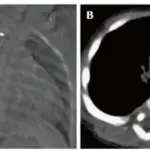Hyper-IgM syndrome is an immunoglobulin deficiency syndrome that is characterized by normal or elevated serum IgM levels and decreased levels or absence of other serum immunoglobulins. Hyper-IgM syndrome can result in susceptibility to bacterial infections.
What is the Pathology of Hyper-IgM Syndrome?
The pathology of hyper-IgM syndrome is:
-Etiology: The cause of hyper-IgM syndrome is a variation in the CD40LG gene. Most cases (approximately 70%) of hyper-IgM syndrome are linked to a recessive mutation on the X chromosome. These cases are inherited as an X-linked recessive genetic trait.
-Pathogenesis: The sequence of events that lead to hyper-IgM syndrome are due to a variation in the CD40LG gene, which causes the body to not produce enough CD40 ligand, or produces an abnormal form of the CD40 ligand. Individuals with hyper-IgM syndrome lack functional levels of CD40 ligand, resulting in the B cell immune response that is deficient due to a result of a T cell defect.
-Morphologic changes: The morphologic changes involved with hyper-IgM syndrome are signs and symptoms of recurrent bacterial infections.
How does Hyper-IgM Syndrome Present?
Patients with hyper-IgM syndrome are typically in males because of the X-linked recessive inheritance pattern. Hyper-IgM syndrome may be diagnosed at very early age within one year. The symptoms, features, and clinical findings associated with hyper-IgM syndrome include frequent bacterial infections, especially bacterial pneumonia
How is Hyper-IgM Syndrome Diagnosed?
Hyper-IgM syndrome is diagnosed by blood tests to determine the status of immunoglobulins in the blood, including normal or high levels of IgM and low levels of other immunoglobulin classes. Flow cytometry may be used to aid in diagnosis, as well as genetic testing.
How is Hyper-IgM Syndrome Treated?
Hyper-IgM syndrome is treated by immune globulin replacement therapy. Patients with the X-linked form or CD40 mutations are given prophylactic antibiotics to prevent bacterial infections.
What is the Prognosis of Hyper-IgM Syndrome?
The prognosis of hyper-IgM syndrome is poor. Individuals with hyper-IgM syndrome are susceptible to various infections and cannot fight off infections well once they occur. Without proper treatment, these infections can become life-threatening.



